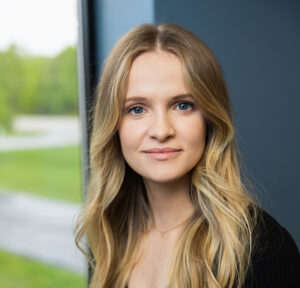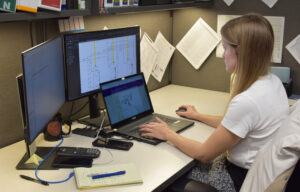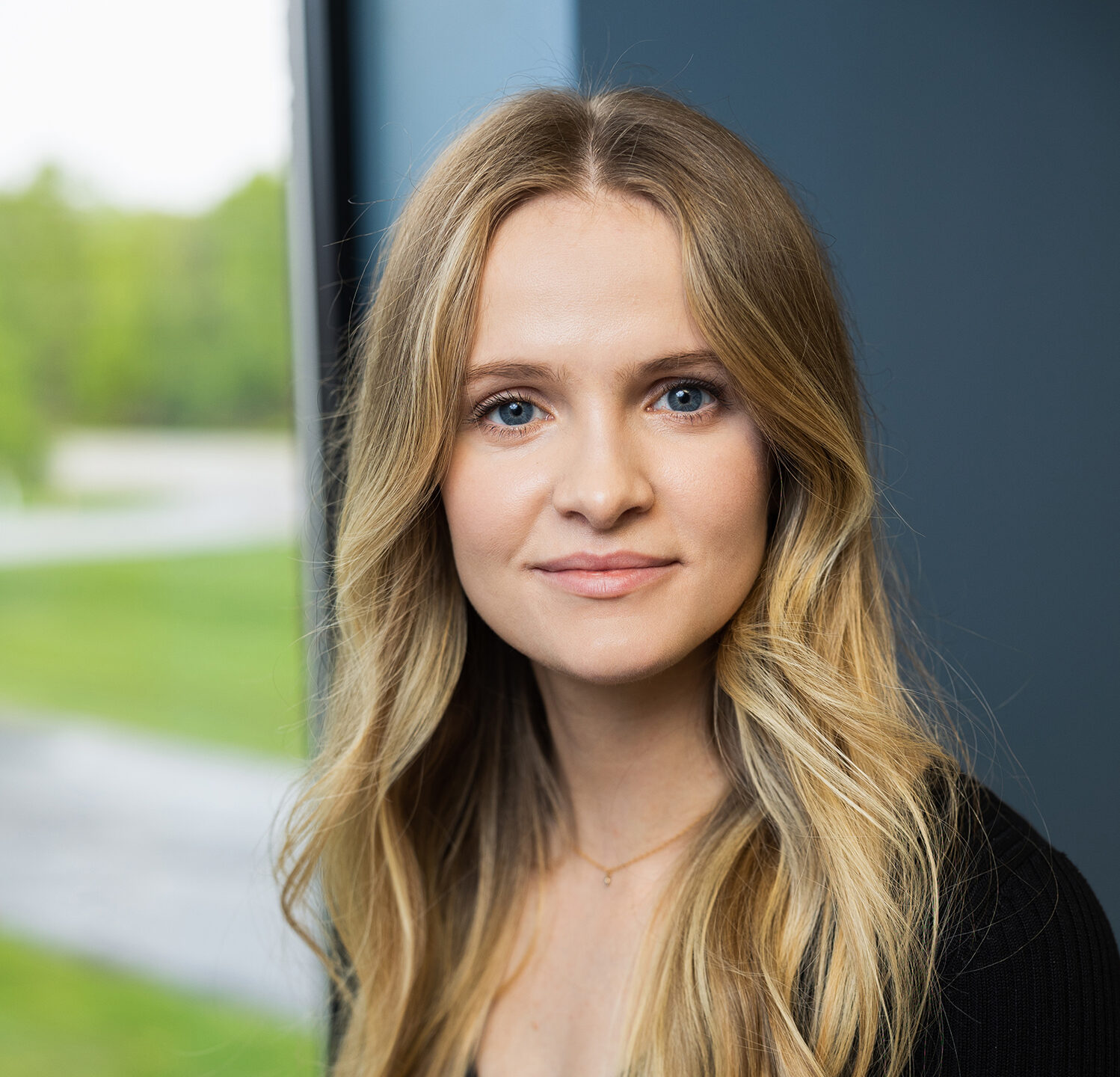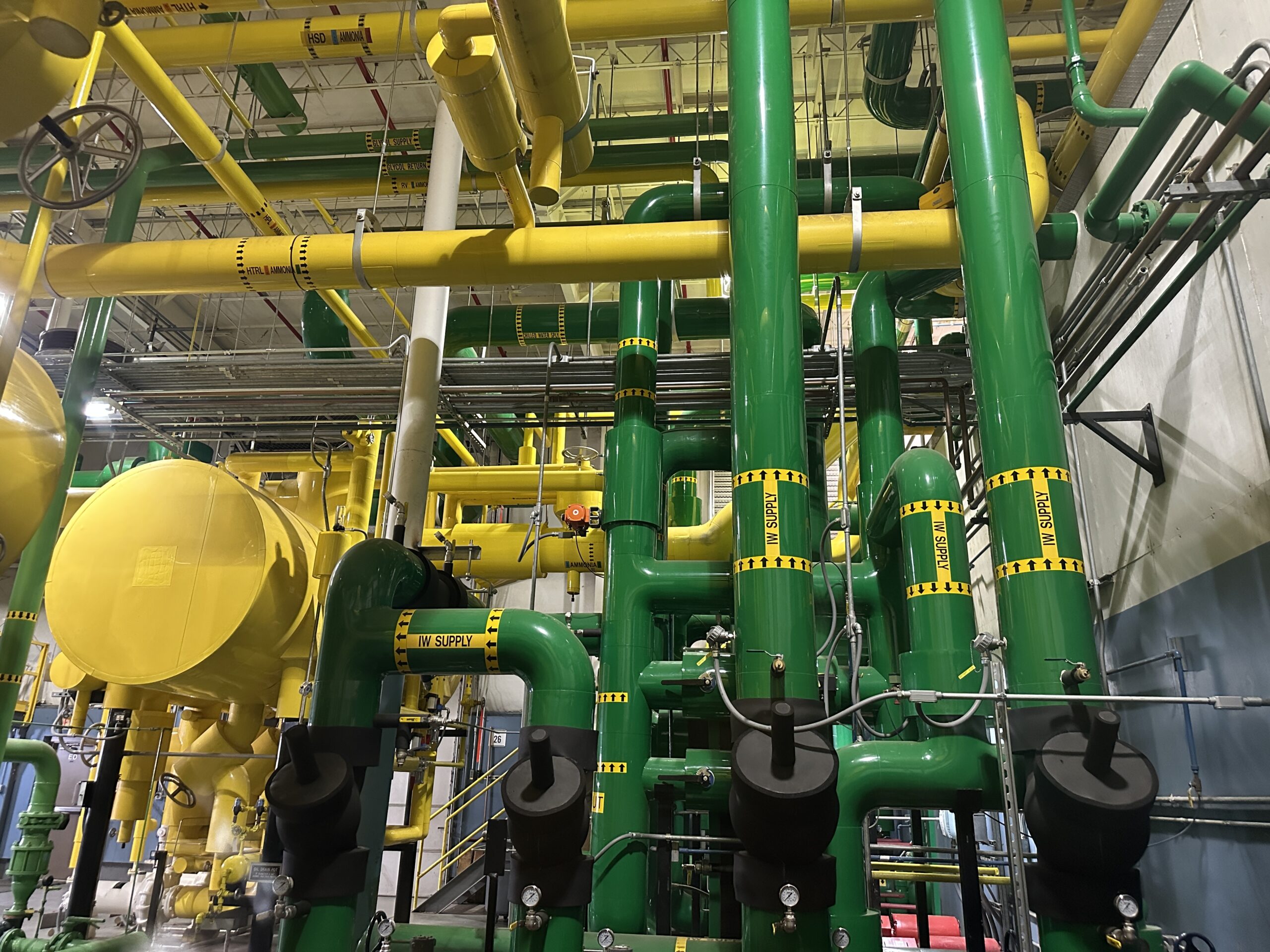Bassett Mechanical strives to Create Customers for Life®, and we know it takes the expertise of each of our 500+ Bassett Mechanical Family members to provide an unrivaled experience for our customers. We want to introduce you to the brilliant people in our company who have dedicated many years to serving, guiding, caring, and giving their all to deliver the highest quality solutions for our customers.
This time, we are shining the spotlight on an inspiring woman engineer. We want to introduce you to Hillary. Hillary is a Refrigeration Engineer and has been with Bassett for almost two years.
 Tell us about your journey to Bassett Mechanical.
Tell us about your journey to Bassett Mechanical.
Right out of college, I started working at Frick as a mechanical engineer. After about a year there, I was ready to try something else.
The pandemic hit just after transitioning to a job in maintainability engineering in the defense industry. And like many others during the pandemic, I had too much free time. Not knowing what else to do with my time, I took a job at a flight school where I was a student, working in IT and proctoring exams. Around the winter of 2020, I was looking for a more permanent job but wanted to explore living somewhere outside of Pennsylvania. Bassett had reached out to me with an opportunity that sounded interesting and checked all the right boxes. The next thing I know, it’s -20 degrees outside, and I’m in Wisconsin!
Can you describe your role at Bassett as an Industrial Refrigeration Engineer and your growth here? Why Industrial Refrigeration?
Primarily my role is to design industrial refrigeration systems, whether from scratch or to make changes to existing systems. In college, I took an interest in heat transfer and fluids, which has made refrigeration somewhat of a clear-cut choice. It combines the two and a hefty amount of problem-solving!
Tell us about the exciting projects you’re working on at Bassett.
I am currently working on a project for a new containerized refrigeration system for one of our customers. We wanted to give them the most practical changes to their system without requiring substantial site reconstruction. It is the first project that I have designed, and it’s certainly an exciting process.
What’s your favorite part of the job?
The best part is when I leave the office and spend time on site. It’s important to see the systems closely and understand their construction, which can’t be done just by looking at a drawing. Especially being new to the industry, it’s not easy to get exposure to the installation process when working on just the design side. Seeing things up close makes designing decisions and anticipating installation concerns easier. It’s also nice to have a break from the everyday routine, leave the desk, and learn about the industries that refrigeration runs adjacent.
What’s the most challenging part of the job?
There is a lot to learn and a lot of responsibility. From my perspective, experience is the best teacher in this industry, and that can take a lot of time to gather. Thankfully there are plenty of engineers here who have a lot of experience, and they’re very welcoming, patient, and helpful!
Many people imagine engineers sitting in their offices and making calculations all day. What are the biggest misconceptions people have about your job?
Many people I meet think I design the refrigerators in their kitchen, or I know everything about their window AC… which… I don’t. Jokes aside, a lot of engineering is just that; running numbers and making assumptions when needed. Understanding codes and regulations in real-time as they change and forecasting shifts in the industry and business is one facet of engineering that isn’t widely considered. Engineering is often heavily intertwined with business, which can add some complexity.
 What sparked your interest in engineering? Did you have any engineering influences as you were growing up?
What sparked your interest in engineering? Did you have any engineering influences as you were growing up?
My Dad was the most significant influence growing up as I always followed him around when he was home working on projects. Whether building our apple cider station, a chicken coop, fixing the car, or creating computers, I always wanted to help. The best part was seeing the intersection of creativity and problem-solving and having something tangible come out of the process. He taught me to attempt even the most difficult things I knew nothing about and helped me build the confidence to go after engineering. Even now, from half a country away, my dad and I are always trading ideas for projects we are working on or something that needs fixing.
What inspires you about engineering?
Engineering has always been particularly inspiring because of the stories I read about the engineers in the Apollo and spy plane eras, where there was intense purpose and devotion to making vast improvements in engineering in little time. Some of the most significant milestones humankind has reached were made by engineers that showed up and gave something their all. We’re all capable of that.
What are you most proud of in your engineering career?
I have a profound interest in engineering design for sustainable means. My college capstone project was a proof of concept for generating electricity using a micro-hydro-electric station. We designed and built a fully automated power station in a small dam only 12’ high. While we narrowly missed our target for generation, the project served as a proof of concept despite a small budget and little experience in the subject. We managed to create something that could help reduce the use of fossil fuels and improve the power availability of homes in areas where grid stability is low. It’s projects like these that I have seen through the original concept to the result, which also bears a valuable and positive outcome, that I am most proud of.
The statistics are stark regarding the representation of women in engineering. How has your experience been?
Well, I have a lot of stories to tell. I have seen the good and bad, back to answering, “What is your major?” in college. When I graduated, I earned my degree alongside maybe a dozen other women in a class of about one hundred mechanical engineering graduates. I hope the statistics become more balanced with time, not just with women but people from diverse backgrounds. The best source of ideas is the most expansive pool of experiences.
What are your hopes for the future of engineering?
I like to think there is a more significant push toward the manufacturing and engineering sectors to orient their designs and processes towards more sustainable methods. I look forward to a future where solutions that seem idealized are instead proactive. While in college, I experienced class sizes expand to the point where there were often not enough seats or equipment for each student, even in upper-class engineering courses. I see this as an indication that my generation is interested in solving problems and is involved in improving our futures.
What advice would you give the next generation of women interested in engineering?
Wear sunscreen. Get comfortable with being wrong. Always welcome the opportunity to learn and take self-improvement seriously. Be prepared for classmates, professors, and random people who ask what you do to the sideline, reduce, and judge you. You will feel responsible for the way every woman in engineering is perceived.
Nevertheless, it is a gratifying path to take. It fuels even the slightest curiosity and will change how you approach every life decision. Engineering gives you the confidence to fix your car and build a computer you may know nothing about but want to achieve.
When you work with Bassett Mechanical, you’re working with the top experts in the field. Our team of experts is always ready to help our customers. We plan for success through detailed preparation and following our proven path for creating safe, responsible solutions and happy customers.




